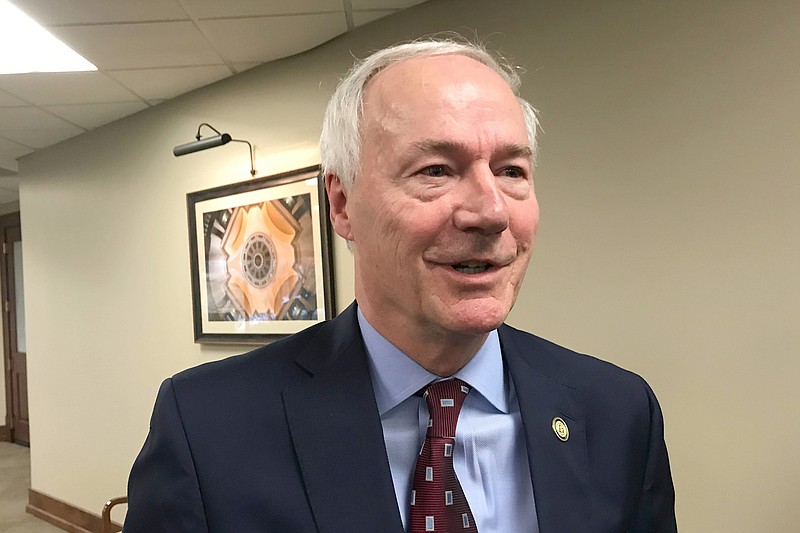Arkansas' governor on Monday announced his veto of a bill that would ban gender-affirming care for transgender youths, prompting proponents of the legislation to urge both chambers to override his decision.
Arkansas would be the first state to put such a ban into law, which would put the state in the national spotlight.
House Bill 1570 would prohibit health care providers from administering gender transition treatment, including surgery and hormone therapy, to people under 18.
[Video not showing up above? Click here to watch » https://www.youtube.com/watch?v=9Jt7PxWkVbE]
Gov. Asa Hutchinson's decision can be overturned with a simple majority in both chambers, and the motion to override the veto can be brought up as soon as this afternoon.
In announcing his decision, the Republican governor described the GOP-sponsored legislation as "a product of the cultural war in America" and said it was well-intended but was a vast government overreach.
"House Bill 1570 would put the state as the definitive oracle of medical care overriding parents, patients and health care experts. While in some instances the state must act to protect life, the state should not presume to jump into the middle of every medical, human and ethical issue," Hutchinson said.
The governor also cited opposition to the bill from leading medical associations in Arkansas, which consider the treatments for transgender youths best practice. Representatives of the state chapter of the American Academy of Pediatrics have testified against the bill.
A half-hour after Hutchinson told reporters of his decision, the bill's sponsors held a news conference urging their legislative colleagues to override his decision.
"We must protect children from experimentation. Anything else is not acceptable," the House sponsor, Rep. Robin Lundstrum, R-Elm Springs, said.
Lundstrum said she did not know when she would bring up the motion to override the veto in the House.
Hutchinson, as well as the bills' sponsors, have acknowledged that the surgeries the legislation targets are not being performed on children in Arkansas. The governor said if the bill only banned the surgeries, he would have signed it.
He also said he was concerned that the bill did not grandfather in minors currently undergoing hormone treatment, because it will halt their medical care if it becomes law. He noted that fewer than 200 young people in Arkansas are receiving any kind of hormone treatment.
"That makes my heart break to think about it," Hutchinson said.
Asked if she would consider running a bill that was limited to banning surgeries or one that did not stop hormone treatment for youths currently receiving it, Lundstrum said she was not aware that the governor had made those statements and declined to comment.
Lundstrum described the proposed ban as "tightly crafted" and likened it to other ways the state is involved in children's health and safety, such as requiring that new parents have a child seat in their car when leaving the hospital.
The Senate sponsor, Sen. Alan Clark, R-Lonsdale, said he was "shocked and disappointed" by the governor's veto.
"How do you explain to an adolescent the long-term implications of these treatments?" Clark said. "My heart goes out to children who truly have a confusion about gender. My heart goes out to their parents. I can't imagine what it would be like to be in that situation. That makes them vulnerable."
Clark cited a 2020 legal ruling in the United Kingdom that requires children under 16 to gain court approval before accessing puberty-blocking drugs. The state senator indicated that health care providers felt pressured to provide those treatments or otherwise be called bigoted.
Dr. Michele Hutchison, a pediatric endocrinologist and a co-founder of the Gender Spectrum Clinic at Arkansas Children's hospital, said at a recent committee hearing that children who come to the clinic must be in intensive psychotherapy before being prescribed any cross-sex hormones or drugs that block the onset of secondary sex characteristics during puberty. She also said some children realize after counseling that they are not transgender.
OPPOSITION TO BILL
In the days leading up to Hutchinson's deadline of whether to sign or veto the bill, or to let it become law without his signature, transgender-rights advocates urged people to call his office and ask him to veto the bill.
About 200 people gathered at the state Capitol to protest the legislation on Saturday, in an event organized by health care providers, the Arkansas Democrat-Gazette reported.
"Families of transgender youth and [health care] providers are making informed decisions about what's best for them in evidence-based practice," Carmen Angelica, a 24-year-old transgender woman and nursing student, said at the rally. "These decisions are not based in politically correct pretense or fantasy. It is the evidence, and it is the reality."
Hutchinson said Monday he had received hundreds, if not thousands, of calls about the bill from Arkansans and people from other states.
In a written statement Monday afternoon, the American Civil Liberties Union of Arkansas attributed the governor's decision to people who asked him to veto the legislation and said the bill could face a legal challenge if it becomes law.
"This veto belongs to the thousands of Arkansans who spoke out against this discriminatory bill, especially the young people, parents and pediatricians who never stopped fighting this anti-trans attack," Holly Dickson, executive director of the ACLU of Arkansas, said. "Medical decisions should be left up to trans youth, their parents, and their doctor -- not politicians or the government. Arkansas legislators should recognize the work Governor Hutchinson put into this decision and follow his lead by allowing the veto to stand. We remain committed to stopping this law from harming the people of this state, including going to court if that is what legislators force these families to do to protect their children."
Eric Reece, the Arkansas manager for the Human Rights Campaign, said in a statement that the veto "will prevent further discrimination against transgender kids who are simply trying to receive gender-affirming care that will improve their health, safety and wellbeing."
"Reaffirming access to this medically necessary care is an important step to prevent discrimination and exclusion of transgender kids. What's too extreme for Governor Hutchinson should be too extreme for any governor," Reece said.
NATIONWIDE EFFORT
2021 has been a record year for legislation that targets transgender people, according to the Human Rights Campaign, which is the nation's largest LGBTQ civil rights organization. There are 29 bills under consideration in state legislatures across the country that would ban gender-affirming care for transgender youths, according to the group.
HB1570 has the support of the Family Research Council, a national conservative group, and the Arkansas Family Council.
"The Arkansas Legislature needs to step up and override the governor's veto to make sure this good bill becomes law. Gender-reassignment surgeries can leave children sterilized and scarred for life. Medical researchers do not know the long-term effects these procedures can have on kids. This is why many people equate them with experimenting on children. Arkansas must protect its children from these sex-reassignment procedures," Arkansas Family Council President Jerry Cox said in a written statement Monday.
The Family Research Council also urged the Arkansas Legislature to override Hutchinson's veto.
"The Arkansas Legislature has demonstrated leadership and courage in the face of the Left's campaign of deception combined with spineless wokeism of Corporate America. The Legislature cannot stop now and deprive Arkansas' children of this much needed protection. Under the leadership of Rep. Robin Lundstrum and Sen. Alan Clark, the Arkansas Legislature courageously passed the first-of-its-kind protection for minors from experimental gender transition procedures," Family Research Council President Tony Perkins said in a written statement.
Transgender young people and their family members, as well as health care professionals who work with transgender youths, testified at committee hearings on the bill that the treatments are not experimental or damaging, and shared the joy that came when they or their patient or loved one was able to live as their true selves. They also warned that not being able to access those treatments will result in more suicide attempts among that population.
Hutchinson acknowledged that his veto is likely to be overturned in the majority-GOP Legislature. The measure passed 70-22 in the House and 28-7 in the Senate.
MORE LEGISLATION
Separately, the Arkansas Senate on Monday approved a bill that would allow the attorney general to undertake legal action to prohibit transgender women from participating in girls' or women's sports at schools and colleges in Arkansas.
The Senate voted 26-6 to approve Senate Bill 450 by Sen. Missy Irvin, R-Mountain View, sending the bill to the House for further action.
The measure has been touted by Republican Attorney General Leslie Rutledge, who is running for governor in 2022.
Irvin told senators that "this is a second layer of protection" for the athletic opportunity and ability of female athletes.
On March 25, Hutchinson signed into law Act 461, which is another bill sponsored by Irvin to allow student athletes to take a private cause of action if they are deprived of athletic opportunity by a school not maintaining separate teams for cisgender female students.
SB450 would bar people assigned the male gender at birth from an intercollegiate, intramural or club athletic team or sport that is expressly designated for females, women or girls.
Irvin told senators on Monday SB450 would allow the attorney general to bring a cause of action for injunctive relief against a school or college that knowingly violates the bill's provisions and the directors, officers, agents and employees of a school or college that knowingly violate the bill's provisions.
Under SB450, a court that finds a school or a college that has knowingly violated this bill would be required to, in addition to awarding injunctive relief, enter an injunction barring the college or the school from receiving funds from any public source for one year.
Opponents of the bills related to transgender athletes say the problem is nonexistent in Arkansas.
If this issue were to arise at the college level, the NCAA already has rules in place allowing transgender athletes to participate in sports that align with their gender identity after one year of hormone treatment.
Senate Democratic leader Keith Ingram of West Memphis questioned Irvin whether anybody has given any consideration to the potential impact of the bill if the NCAA decides not to have a regional basketball tournament in Little Rock or not allow a regional baseball tournament at the University of Arkansas in Fayetteville.
Irvin said she doesn't believe anybody elected the NCAA should make decisions for Arkansas and "our constituents elect us into this legislative body to pass laws and write policy for the state of Arkansas."
"That's what we are doing," she said.
Ingram said he doesn't think his question is a hypothetical question about the NCAA.
Irvin said Idaho passed similar legislation and there have not been courses of action against Idaho during the past year.
The Idaho law has been blocked from taking effect by a court ruling. Cathryn Oakley, state legislative director and senior counsel with the Human Rights Campaign, said last month that Idaho did lose some NCAA events, but it was ambiguous as to whether they were canceled as a result of the law or because of the covid-19 pandemic.
In a letter to Human Rights Campaign leadership Thursday, NCAA President Mark Emmert said the organization believes the transgender-athlete legislation that has been signed into law or is under consideration in a number of states conflicts with the NCAA's core values, and that the NCAA Board of Governors policy requires championship host sites to "demonstrate how they will provide an environment that is safe, healthy, and free of discrimination."
Information for this article was contributed by Tess Vrbin of the Arkansas Democrat-Gazette.

